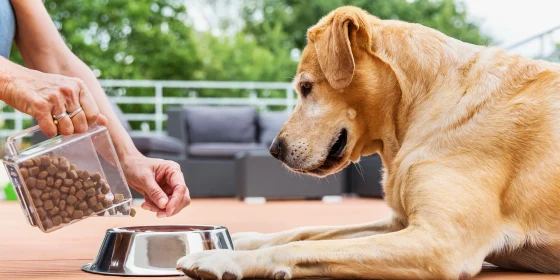Caring for Senior Dogs: Tips for a Happy Golden Age
Tips for a Happy Golden Age

As our beloved dogs age, their needs change, and caring for them requires a bit more attention and understanding. Senior dogs can experience a variety of health issues, but with proper care and love, their golden years can be just as joyful and fulfilling as their younger days. In this blog, we’ll explore essential tips for caring for senior dogs to ensure they live their happiest and healthiest lives.
About Skipper’s Pet Products
Skipper’s Pet Products, founded in 2013 by Steve Moore, is a reputable UK-based company specializing in premium dog treats. With a background as a former fish merchant, Steve’s commitment to sustainability shines through in the company’s practices. Skipper’s Pet Products utilizes ethically sourced materials from sustainable fisheries, minimizing waste by utilizing fish co-products such as fish skin. Additionally, they employ recycled energy for low-temperature drying processes, ensuring maximum nutritional value in every treat. This dedication to quality and sustainability makes Skipper’s Pet Products a great choice for pet owners looking to provide their senior dogs with healthy and nutritious snacks.
Understanding the Needs of Senior Dogs
Senior dogs typically fall into the age category of 7 years and older, though this can vary by breed. Larger breeds often age faster than smaller ones, so it’s essential to recognize the signs of aging early. Common issues that arise in senior dogs include arthritis, dental problems, decreased energy levels, and changes in behavior. Understanding these needs is the first step toward providing appropriate care.
Nutrition Matters
One of the most critical aspects of caring for senior dogs is adjusting their diet. Senior dogs may require fewer calories than they did when they were younger, but their nutritional needs are just as important.
- Choose high-quality food: Look for dog food specifically formulated for seniors, as it often contains the right balance of nutrients and lower fat content.
- Consider joint health: Foods rich in omega-3 fatty acids and glucosamine can help alleviate joint pain associated with arthritis.
- Monitor weight: Keep an eye on your dog’s weight. Obesity can exacerbate health issues, so maintaining a healthy weight is essential.
Regular Veterinary Check-ups
Routine veterinary visits become increasingly important as dogs age.
- Schedule bi-annual visits: Older dogs should see the vet at least twice a year for comprehensive health checks.
- Discuss concerns: Don’t hesitate to bring up any changes in behavior, appetite, or energy levels with your vet.
- Vaccinations and preventative care: Ensure your senior dog is up-to-date on vaccinations and parasite preventatives.
Exercise and Mental Stimulation
While senior dogs may not have the same energy as they once did, regular exercise and mental stimulation remain crucial for their well-being.
- Tailor their exercise routine: Shorter, more frequent walks can be beneficial. Adjust the pace to your dog’s comfort level.
- Engage their minds: Puzzle toys, interactive games, or simple obedience training can provide mental stimulation and keep your dog engaged.
- Socialization: Encourage social interaction with other dogs and people to keep your dog mentally sharp and emotionally happy.
Comfortable Living Environment
Creating a comfortable home environment is vital for senior dogs. As their mobility decreases, certain modifications can significantly enhance their quality of life.
- Cozy resting areas: Provide soft bedding in quiet, accessible areas. Orthopedic beds can be especially beneficial for joint support.
- Easy access: Consider using ramps or stairs to help your dog access cars, furniture, or outdoor spaces without straining.
- Temperature control: Ensure your home is at a comfortable temperature, as senior dogs can be more sensitive to extreme heat or cold.
Grooming and Hygiene
Maintaining good hygiene and grooming practices is crucial for senior dogs, as they can be prone to skin conditions and dental issues.
- Regular brushing: Keep your dog’s coat healthy by brushing regularly. This can help manage shedding and prevent matting.
- Dental care: Dental health is vital for senior dogs.
- Nail trimming: Regularly check and trim your dog’s nails to prevent discomfort while walking.
Considerations for Pain Management
Many senior dogs suffer from chronic pain, often related to arthritis or other age-related conditions. Managing this pain is essential for their quality of life.
- Consult your vet: Talk to your veterinarian about pain management options, including medications, supplements, or alternative therapies like acupuncture.
- If you notice signs of pain, such as reluctance to move or changes in mood, consult your vet.
Quality Time and Affection
Lastly, but perhaps most importantly, providing love and companionship is essential for a senior dog’s happiness. Spend quality time with your dog, whether through gentle play, cuddling, or simply being present.
- Create routines: Senior dogs thrive on routine. Establishing a daily schedule for meals, walks, and playtime can provide comfort.
- Show affection: Never underestimate the power of love. Spend time petting, grooming, and simply being with your dog to strengthen your bond.
Conclusion
Caring for senior dogs requires a blend of love, attention, and understanding of their unique needs. By adjusting their diet, providing regular veterinary care, maintaining a comfortable environment, and ensuring they receive adequate exercise and mental stimulation, you can help your furry friend enjoy their golden years to the fullest. Remember, your senior dog has given you years of joy, and now it’s your turn to give them the best care possible.




